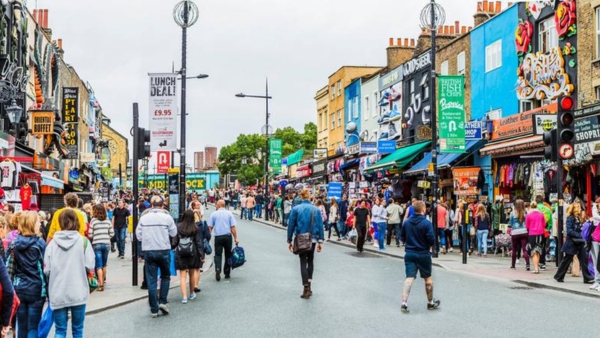The UK can learn from the US experience of decentralising power to cities, argues Bruce Katz in this blog, one in a series of articles from members of the UK Urban Futures Commission.
The driving goal of the UK Urban Futures Commission is to unlock the potential of UK cities. That singular act, deceptively simple in its articulation, would have dramatic, outsized effects not only on reducing long-standing spatial disparities in the UK around incomes, health, and wealth (‘levelling up’ in a phrase) but also on making the UK globally competitive in a post-Brexit world.
From a US perspective, unlocking the full potential of cities requires a fundamental, paradigmatic change in thinking about how nations are governed and a radical shift in power and culture across multiple levels of government and sectors of society.
For the past several decades, US cities (and metropolitan areas more broadly) have been at the vanguard of addressing some of the nation’s most pressing challenges: technological change, economic restructuring, climate change, inter-generational poverty and housing unaffordability, just to name a few.
The ability of US cities to problem-solve is deeply rooted. Local governments have significant roles and responsibilities in our federal republic and bring real money to the table given their fiscal powers. As importantly, however, US cities operate as horizontal networks of public, private, and civic institutions – elected officials and city governments certainly, but also large companies, small- and medium-sized enterprises, business chambers, universities, hospitals, philanthropies, community organisations and beyond.

UK Urban Futures Commission
Unlocking the potential of UK cities, to drive economic, social and environmental improvements for people and for the country.
Pragmatism vs ideology
The networked nature of cities means that local leaders, unlike members of national political parties, tend to embrace pragmatism rather than ideological rigidity. They reward action rather than obstruction. It also means that cities, unlike hierarchical, specialised national bureaucracies, can design and deliver interdisciplinary and customised solutions to hard challenges as well as leverage the distinctive opportunities of their economies.
The post-pandemic period is putting the power and problem-solving culture of US cities to the test. Heightened geopolitical tensions with Russia and China have made the reshoring of production, both military and civilian, an issue of national security. After decades of offshoring, outsourcing and globalisation at any cost, the US is suddenly realising it needs to make things again.
Climate change likewise is requiring an industrial transformation of monumental proportions – in the electrification of our automobiles, the design, operations and location of our buildings and the source and transmission of our energy.
To add more complexities, remote work now appears to be a structural shift rather than a cyclical aberration, upending decades of central business districts becoming dense employment areas for government, financial institutions, supportive firms and technology companies.
Restructuring the economy
All these changes are affected by unprecedented federal policies and investments that provide a strong foundation for restructuring the national economy but require cities to deliver what comes next.
In other words, the US is simultaneously decoupling, decarbonising and deconcentrating. These macro forces have profound metro effects.Advanced manufacturing, for example, does not exist in the ether or abstract. It values places that can provide industry with the platforms and tools they need to succeed. Large companies and smaller firms alike need suitable sites for production activity, properly assembled, prepared and zoned.
They need access to a steady stream of qualified workers who can master the complex nature of advanced production, applied researchers who can continuously assist with product and process innovation, quality and affordable housing, and infrastructure of all types that can enable the efficient movement of ideas, goods, services, workers and energy, within and across metropolitan areas.
Only cities can pull all these disparate elements together. Central or federal governments talk a unified game but then invest through, literally, hundreds of programmes, often delivered through a bewildering and uncoordinated array of block grants, competitive grants, low-cost financial products and tax incentives. It is safe to say that the Rubik’s Cube is child’s play by comparison. Cities are compelled to bring order out of this programmatic chaos.
For the past several decades, US cities and their metropolitan areas were told to plan for a post-manufacturing future, driven by service rather than production economies. Now, almost overnight, they are being compelled to implement an industrial transition of major consequence. And that is what is happening, slowly but surely.
Industrial policy
A new kind of bottom-up industrial policy is being invented on the fly at the city and metropolitan levels:
- Buffalo, New York, is expanding a manufacturing-oriented workforce development centre to meet the demands of the reshoring moment.
- Cincinnati, Ohio, is acquiring industrial sites and readying them for business retention and expansion, addressing vacant historic manufacturing corridors.
- East Providence, Rhode Island, is investing in a 33-acre riverfront parcel along the Providence Worcester Railroad to become a regional hub for the offshore wind industry.
- El Paso, Texas, is using its airport to cluster small- and medium-sized businesses with research and innovation assets, with the intention of bringing them into the region's established aerospace and defence supply chain.
- St. Louis, Missouri, is establishing an Advanced Manufacturing Innovation District to serve the needs of Boeing and its suppliers in the defence aerospace sector.
The city-led industrial transition underway in the US is broad and multi-pronged. And it is organically bottom-up, enabling cities to recognise and build upon distinctive advantages.
What UK cities can learn from their US counterparts
What does this mean for the UK? Some early signals are apparent.
1. Acknowledge the new order
The future of UK cities should not be driven by a vision of the economy circa 2019, before the global pandemic took effect, the war in Ukraine was launched and tensions with China reached new heights. A new world economic order is in its infancy, which alters the raison d’etre of many older industrial cities. To the greatest extent practicable, this new order needs to be captured, named and quantified; it provides a compelling rationale for empowering cities.
2. Leverage existing assets
UK cities have many assets and proven initiatives hidden in plain sight. St. Louis, for example, is explicitly modelling its actions on the Sheffield Advanced Manufacturing Research Centre (AMRC). Launched in 2001 as a £15m partnership with Boeing, AMRC has become a vibrant, globally recognized hub for applied R&D, startup activity and skills training.
AMRC anchors a 150-acre Advanced Manufacturing Park, which houses almost 100 companies, including Rolls-Royce, McLaren Automotive, British Steel and the UK Atomic Energy Authority. I suspect that AMRC is just the tip of the iceberg; how many more urban assets and initiatives are there to be leveraged?
3. Collaboration must be radical
Unlocking the full potential of UK cities will require more than devolving formal governmental powers from central government to cities and conurbations. Enabling radical collaboration between public, corporate and civic players is as critical a path to innovative, inclusive and sustainable growth.
For decades, the UK has treated decentralising power as a nice thing to do rather than a must thing to have. It is time to empower cities full stop as a means, particularly in a post-Brexit world, to grow the economy and restore vitality and purpose to national life.
Bruce Katz is the Founding Director of the Nowak Metro Finance Lab at Drexel University. He is a Member of the UK Urban Futures Commission.
Read more UK Urban Futures Commission related articles
-
Investment for inclusive and sustainable growth in cities
Blog
Anna Valero
Anna Valero highlights a decisive decade for addressing the UK’s longstanding productivity problems, large and persistent inequalities across and within regions, and delivering on net zero commitments.
-
Valuing cities
Blog
Prof. Michael Keith
UK Urban Futures commissioner Michael Keith explains why it's important to value the way cities combine material, social and technological forms.
-
Creating the future of the city
Blog
Polly Mackenzie
Creativity can help solve some problems of city life while tackling climate change. UK Urban Futures Commissioner, Polly Mackenzie, writes the first in a series of blogs for our intervention.



